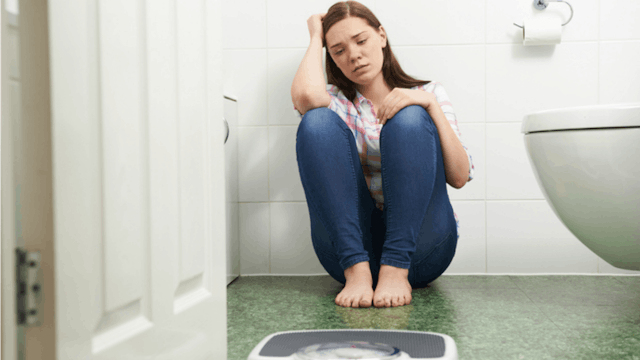Why I Will Never Say 'I’m Fat' In Front of My Kids

Recently, we were out to dinner with my aunt. My five-year-old, in true kid fashion, thrust the bread basket right in front of my aunt and asked her if she wanted him to butter another piece of bread for her. It was his way of trying to polite, although the truth is that he just really enjoys opening restaurant butter packets and smothering as much butter on bread as humanly possible.
“I can’t eat any more bread, sweetie,” my aunt said. “I’ll get fat!”
Now, I know my aunt meant well and wasn’t trying to do anything controversial or harmful. But when I heard her say “I’ll get fat,” my blood pressure rose about 20 notches and my little mama-bear antennae shot right up.
Without thinking, I immediately shot her a look (she’s like a mother to me and knows exactly what my “looks” mean). A few seconds later, I took her aside and told her to please never say that again in front of my kids.
Why was I acting this way, you might ask. It’s a pretty innocent comment, right? One that so many women (and even men) make every day. It’s no biggie.
Except it is.
As the words left her lips, I realized it was something that I have made a point – unconsciously up to this point – never to ever say in front of my kids.
Don’t get me wrong, “I’m fat” or “I’ll get fat” are phrases that play through my mind all the time. I try to be as body positive as I can, but like 99% of the population, the message that my body is somehow less-than has been drilled into my head since I was a small child.
I have spent years believing I was fat, ugly, and everything else. Although I never developed a full-fledged eating disorder, I spent my 20’s skipping meals, starving myself, trying to reach an ideal that just wasn’t going to happen. Thankfully, those years are past, and body dysmorphia and disordered eating are mostly ancient history for me.
But I still hear those voices at times. The ones that tell me that my naturally wide hips and ass are unwanted, take up too much space. That my fleshy arms and cottage-cheesy thighs are disgusting.
Those voices are there, but I keep them in check for my kids. Even if I’m faking it half the time, there is no way in hell that I will use disparaging words like “fat” to describe my own body or anyone else’s. There is no way I will perpetuate the myth that anybody’s body is better or worse than anyone else’s.
Obviously, my kids are going to hear that kind of crap elsewhere. I can’t control that, nor do I expect to. However, I feel that the way that my kids’ parents and close family members speak to them about bodies is crucial. In so many ways, the adults that are closest to them are their first teachers, so their words really do matter.
Our home is one where differences are celebrated, where everyone is beautiful in their own way. It’s a home where it’s okay to express discomfort and even anger, but it’s never okay to mock or tease or put down others. And our home is one where each of us is allowed body autonomy, where no one is allowed to do anything with their body that they don’t want to do.
Studies show that kids as young as 8 or 9 years old experience body shame and body dysmorphia. And kids of similar ages (and younger) have been known to develop eating disorders. We can’t do everything to protect our kids – and it’s not always our fault if our children develop eating disorders or body shame issues.
But by God, we all need to do everything in our power to protect our kids from this shit. EVERYTHING. And that includes choosing our words carefully, speaking gently and openly about any issues that do arise, and teaching our children that being healthy isn’t the same as meeting some body image ideal manufactured by society, the media, or anyone else.
Life is hard enough, and we live in a world that is not exactly body positive and inclusive of different body types. Not only that, but our kids are growing up in the age of social media, where kids are more likely to toss insults out in cyberspace and pick apart each other’s appearance on social media apps. (Don’t even get me started about how freaked out I am about all that…)
I’m hoping that by watching my words, practicing as much self-love as possible, and teaching my kids that they are beautiful inside and out, I can lessen some of the difficulties that they will inevitably experience when it comes to their own body image.
I can’t save them in every way, but every bit counts, and the words that come out of our mouths as parents weigh heavily on our kids’ hearts and minds. So let’s ALL work as hard as possible on getting them right.
This article was originally published on